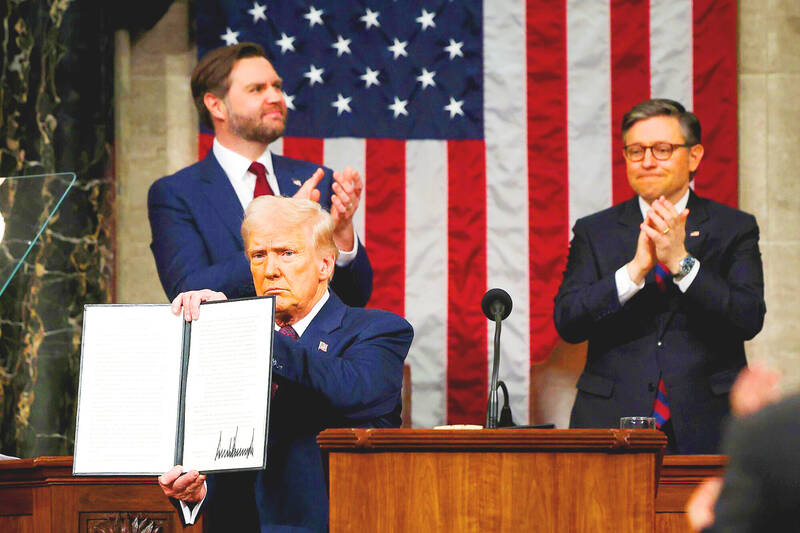US President Donald Trump on Tuesday called for ending a bipartisan US$52 billion semiconductor subsidy program — the CHIPS and Science Act — that has spurred more than US$400 billion in investments from companies like Taiwan Semiconductor Manufacturing Co (TSMC, 台積電) and Intel Corp.
“Your CHIPS Act is horrible, horrible thing,” the US president said in a prime-time address to Congress.
Trump implored US House of Representatives Speaker Mike Johnson to get rid of the legislation and use “whatever is left over” of funds apportioned to the program to “reduce debt or any other reason.”

Photo: Bloomberg
His remarks were met with applause in a chamber that less than three years ago passed the CHIPS and Science Act. US Vice President JD Vance, whose home state of Ohio won a massive Intel project thanks to the law, stood up to show his support for its revocation.
The CHIPS Act is among the most significant US forays into industrial policy in more than a generation. It set aside US$39 billion in grants — plus loans and 25 percent tax breaks — to revitalize US semiconductor manufacturing, as well as US$11 billion for chip research and development.
Democrats and Republicans have touted the CHIPS Act as crucial to US national and economic security, and Trump could have a hard time getting the votes to repeal it. Dozens of Republican lawmakers voted for the measure, and many red districts have won factories or other projects supported by the law.
TSMC and South Korea’s Samsung Electronics Co and SK Hynix Inc have announced or begun construction on multibillion-dollar projects in the US that were contingent on funding and support from the US government.
Representatives of the companies declined to comment on the president’s remarks.
What that actually means for TSMC is murky. The company originally announced plans for a US$12 billion US site during Trump’s first term and expanded that project to three factories under former US president Joe Biden. To support those facilities, TSMC struck an agreement with Biden officials for US$6.6 billion in CHIPS Act grants and US$5 billion in loans.
As is the case for other CHIPS Act awards, the funding is supposed to be disbursed over time, as TSMC hits negotiated project milestones. The company received US$1.5 billion before Biden left office.
However, the company’s newly announced projects — three additional chip plants, plus a research and development center and a factory for advanced packaging — will not win federal funds, US Secretary of Commerce Howard Lutnick said on Monday.
“The main uncertainty is the future of TSMC,” abrdn PLC investment director Xin-Yao Ng (黃新耀) said. “One long-time competitive advantage was their clustering in Taiwan, where labor costs are still reasonable, construction costs are cheaper, government is supportive and they can find more workers with vocational training. It is completely different in the US if they are to shift more manufacturing. Subsidies from US were to be crucial to help mitigate some of the higher costs and challenges.”
TSMC is among 20 companies, which include Micron Technology Inc, GlobalFoundries Inc and Texas Instruments Inc, that reached binding CHIPS Act agreements with Biden officials.
Companies have generally viewed those agreements as ironclad — regardless of who is in office.
However, some of them are worried that the Trump administration could seek to modify the terms. Lutnick has said he cannot commit to honoring existing contracts without reviewing them first.
Meanwhile, the current CHIPS Act team has been preparing a list of potential adjustments to the funding application process and final contracts that would be minimally disruptive.

South Korea’s equity benchmark yesterday crossed a new milestone just a month after surpassing the once-unthinkable 5,000 mark as surging global memory demand powers the country’s biggest chipmakers. The KOSPI advanced as much as 2.6 percent to a record 6,123, with Samsung Electronics Co and SK Hynix Inc each gaining more than 2 percent. With the benchmark now up 45 percent this year, South Korea’s stock market capitalization has also moved past France’s, following last month’s overtaking of Germany’s. Long overlooked by foreign funds, despite being undervalued, South Korean stocks have now emerged as clear winners in the global market. The so-called “artificial intelligence

NEW IDENTITY: Known for its software, India has expanded into hardware, with its semiconductor industry growing from US$38bn in 2023 to US$45bn to US$50bn India on Saturday inaugurated its first semiconductor assembly and test facility, a milestone in the government’s push to reduce dependence on foreign chipmakers and stake a claim in a sector dominated by China. Indian Prime Minister Narendra Modi opened US firm Micron Technology Inc’s semiconductor assembly, test and packaging unit in his home state of Gujarat, hailing the “dawn of a new era” for India’s technology ambitions. “When young Indians look back in the future, they will see this decade as the turning point in our tech future,” Modi told the event, which was broadcast on his YouTube channel. The plant would convert

‘SEISMIC SHIFT’: The researcher forecast there would be about 1.1 billion mobile shipments this year, down from 1.26 billion the prior year and erasing years of gains The global smartphone market is expected to contract 12.9 percent this year due to the unprecedented memorychip shortage, marking “a crisis like no other,” researcher International Data Corp (IDC) said. The new forecast, a dramatic revision down from earlier estimates, gives the latest accounting of the ongoing memory crunch that is affecting every corner of the electronics industry. The demand for advanced memory to power artificial intelligence (AI) tasks has drained global supply until well into next year and jeopardizes the business model of many smartphone makers. IDC forecast about 1.1 billion mobile shipments this year, down from 1.26 billion the prior

People stand in a Pokemon store in Tokyo on Thursday. One of the world highest-grossing franchises is celebrated its 30th anniversary yesterday.